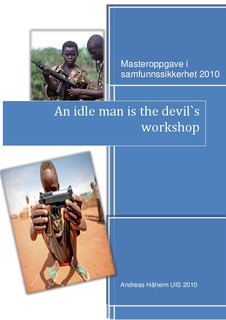| dc.description.abstract | ”War is everywhere, were there is a fight for peace” says Elazar Benyoëtz.
When wars or armed conflicts end, or at least when violence on the ground decreases, hope for sustainable peace building grows. UN General Secretary Ban Ki Moon pointed out the importance of the immediate post‐war period in a report to the Security Council on June 11, 2009: “The immediate post‐war period offers a window of opportunity to provide basic security, deliver peace dividends, shore up and build confidence in the political process, and strengthen core national capacity to lead peace building efforts.”
Ban Ki Moon talks about opportunities, but in my findings I found that an opportunity also presents challenges.
A series of urgent needs have to be answered by local and external actors in the immediate post‐war period. Three issues are on top of the agenda: disarmament, demobilization and reintegration of ex‐combatants (DDR), rehabilitation of the economic and social infrastructure, and the reconstruction of social relations, and most of all mental support for victims.
The aim of this study was to gain new knowledge about one of these challenges; the R-in DRR, and to what extent the reintegration can affect a post -war country. This study looked upon the phenomenon former soldiers and their lives up to the present; if this group still poses a threat to society. The theoretical basis for this task has been the cause of soldiering, and the factors which can lead into taking up arms again; to understand whether or not former soldiers pose a threat to society. In this context it was important to look at incentives that make one become a soldier, and to which extent one is willing to new recruitment. Selective incentives, social class, pressure and sanctions and cultural settings proved in theory to be causal-explanatory to be a soldier. Since this is a study of reintegration of former soldiers, it was also important to gain theoretical knowledge concerning reintegration and factors influencing this process. The theory support important components for a successful reintegration, like livelihood supports, income, education, positive family reunification and acceptance from the community. These factors are vital in helping the former soldier to change his/ her identity and become a full member of a community. Successful long-term reintegration might be a contributor to national conflict resolution. Conversely, failure to achieve reintegration can lead to considerable insecurity at the societal and individual levels. The success of reintegration can also be seen in relation to how resilient the former soldier and the society around him/her are.
To understand DDR it was important to gain knowledge of those who completed the DDR program, which was made through analyzing evaluation reports of the program. This analysis provided new knowledge about the challenges and Lessons Learned, which in turn gave new knowledge about the former soldier's challenges after the war.
To achieve the goal I chose to conduct a field work in a post war country. The choice fell on Sierra Leone, which is struggling with the after effects of an eleven year civil war; a civil war that caused much discussion in an international context because of its brutality and use of child soldiers. Sierra Leone has scheduled elections for 2012, and many international voices have said that this will be the final test of the peace in Sierra Leone. It is therefore necessary to ascertain whether the soldiers; who fought throughout the eleven-year civil war are troublemakers or peacemakers in the run-up to the elections. I spent a seven-week fieldwork in Sierra Leone, where I interviewed former soldiers, observed them in their everyday life, and had meetings with NGO's, stakeholders and governmental organizations.
It is evident in the findings and theory that there is linked a higher risk to the soldiers who were child soldiers during the war. The former child soldiers in this study, and especially those who live in the capital of Sierra Leone, Freetown, show clear risk factors associated with new recruitment. They have no connection to their family or local community, they are struggling in relation to employment and education, and they show strong signs that they have not managed to re-define their identity after the war.
Faction and war experience has no direct effect on whether the former soldier pose a threat in today's society, but it is clear that fraction has helped to create an identity in young men, which is maintained in today's society, and is contributing to the upholding of sub-groups of former soldiers in Freetown. This study showed that DDR had a positive effect, but not for everyone, and the findings showed that those who were youngest when entering the war have experienced little positive effect from the DDR program. On this foundation, I believe it is important to look at the entrance age becoming a soldier in the preparation of measures in a post war country. I also believe that it is important to take in consideration that not everyone will benefit from the DDR program; success depends on a person‟s identity, qualities, maturity and ability to learn, and this must be taken into consideration when the program will be evaluated and renewed.
Based on the findings from this study, I am of the belief that Sierra Leone must take seriously the situation of those who were child soldiers throughout the war, and steer them in directions that can help them redefine their identity. This paper started with saying that post-conflict societies are confronted with overwhelming challenges, and the challenge concerning former child soldiers is just one of the challenges Sierra Leone faces. Based on this study I am still of the opinion that this group must be given priority .If this group is not being taken seriously, they can pose a threat towards the election in 2012. | en_US |
